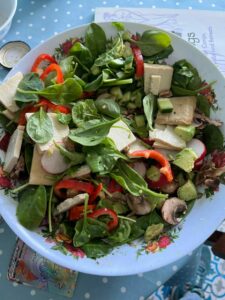Most of our days are spent at the Tel Aviv University campus. Which means we eat there. Often, we bring our own lunches – after having organic vegetables at home, nothing else tastes quite the same – but sometimes we don’t, and we’re presented with quite a dazzling array of choices.
Campus food has developed quite a bit since when I was a student. I remember the law school cafeteria had cheese, egg and tuna sandwiches; the central restaurant had cheap homelike food (meat, various carb options, and some cooked vegetables). In my later days there, there were coffee carts everywhere in addition to the restaurants, and one of the restaurants, in the education department building, served antipasti and couscous. In Berkeley, we were surrounded by a lot of inexpensive restaurants, some of which were very healthy and very tasty.
Tel Aviv University offers quite a lot of different food stalls. The central food court is a microcosm of the food industry, and, accordingly, it ; McDonalds have a restaurant there which, regrettably, has become quite a favorite with the students. It’s quick, and it offers something it calls “California salad” which is basically lifeless iceberg lettuce with some chicken on top. Next door to McDonalds is a local pseudo-Thai chain called Lemon Grass. Calling it Thai is almost a capital offense. It actually offers hideous sushi and other pan-Asian, fake, industrialized things.
Some chains are not that evil. The old Tel Aviv cafe, Alexander, started a new venture called Green Leaves, a salad bar on campus. Each person chooses which vegetables, whole grains, antipasti, cheeses and other fun ingredients go in the salad. Obviously, this option isn’t perfect, either; the vegetables are pre-cut, and the plastic containers can’t be recycled anywhere. But it’s a viable option.
The cafeteria also offers the usual fare of fish, carbs and cooked vegetables, as well as fresh pasta. The students’ metabolism never ceases to amaze me; having pasta with cream sauce day after day is something I can no longer deal with.
Coffee culture in Israel is pretty big, and each of the cafeterias will serve you a very decent cup of coffee, or a nice selection of herbal teas. Two places offer blended/squeezed juices, also a good breakfast option.
Finally, there is the price. A meal in the cafeteria costs an average of 20 to 30 NIS – between 5 and 7 dollars (equivalent to UC Berkeley prices, but with the salaries here so much lower, certainly something to consider). While we’re happy to visit the salad man once in a while, this is certainly not something that a student household can deal with on a daily basis. Nevertheless, I don’t see students with brown sandwich bags or containers from home; In a culture with such culinary savvy, it’s surprising that students don’t take time to relax from their books and cook for themselves.



No comment yet, add your voice below!